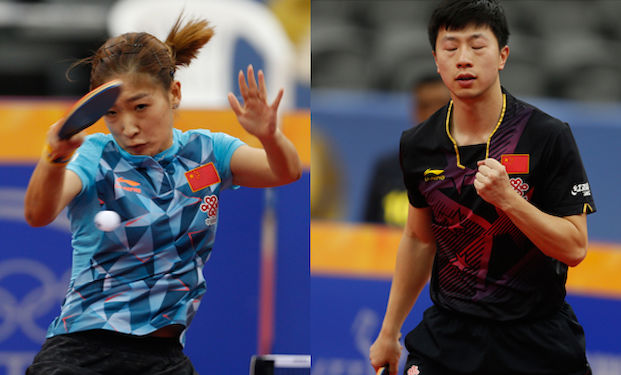"Success breeds success," goes the old saw. There is certainly a preponderance of evidence to support this hypothesis, as the aura of invincibility surrounding athletes in their prime can become a self-fulfilling prophecy. As countries around the world prepare to exhibit their best athletes on the world's biggest stage this summer at the Tokyo Olympics, past success is not only a predictive metric but a non-negotiable criterion for participation. No one gets into the Olympics based on showing potential; rather, you must win your way in, either through qualifying tournaments or an oligarchical world ranking. Nowhere is this competitiveness more extreme than in China's national table tennis team, where even Olympic gold medals and World Championships cannot buy job security. In preparation for the unusually long-awaited summer Olympics, China is staging an Olympic table tennis simulation to hone its sharpest blades against each other. In any other country, the reigning World Champion would be a shoo-in for the subsequent Olympics. Unfortunately for Liu Shiwen (pictured, left) and Ma Long (right), this is not necessarily the case in China. With Olympic rules limiting each country to two entrants in each singles event, women's and men's, the champions are not assured participation. World #7 Liu Shiwen led the Chinese women's team to gold in Rio 2016. She followed up this team success with her solo breakthrough at the 2019 World Championships in Budapest. In yesterday's Olympic simulation, however, the 30-year-old Liu was swept 4-0 in the quarterfinals by 26-year-old Zhu Yuling, listed one spot better at world #6. World #1 Chen Meng remains the favorite to win the title. Meanwhile, over in the men's singles, 32-year-old Ma Long has every advantage in experience but is losing the battle with time. Not only did world #3 Ma win team gold in Rio, he secured the same mineral in men's singles. Even more impressively, he has won the last three men's singles titles at the World Championships, the first player in over half a century to do so. As with his countrywoman Liu, however, previous success could not guarantee present performance. In the men's singles semifinals, Ma fell behind two games to nil in the best-of-seven bout with 24-year-old Zhou Qihao, ranked a distant #122 in the world. As expected, Ma fought back, twice coming back to tie it a two-all and three-all. With all the coaches watching intently, calculating the Olympic significance of each play, Ma forged head, 8-4 in the deciding seventh game. Then, the unthinkable happened: Ma failed to score another point, watching stunned as Zhou stung him with seven straight to steal the match right back. Zhou now faces prohibitive favorite Fan Zhendong for the pretend gold medal with real-life implications. A furious Ma stormed off the court, unable to muster even a Marshawn Lynch-level of perfunctory interview for the waiting reporters. (How do you say, "I'm only here so I don't get fined" in Mandarin?) Was this merely a hiccup in Ma Long's already superlative career, or does this collapse signal the jumping of the proverbial shark, the long-feared inauguration of his "Jordan with the Wizards" phase? Success is certainly a necessary ingredient for confidence, and vice versa. For anyone older than 25 on China's infamously competitive national table tennis team, however, perhaps the bleaker view espoused by former Intel CEO Andy Grove hits closer to home. "Success breeds complacency," observed Grove. "Complacency breeds failure. Only the paranoid survive."
More at Xinhua
